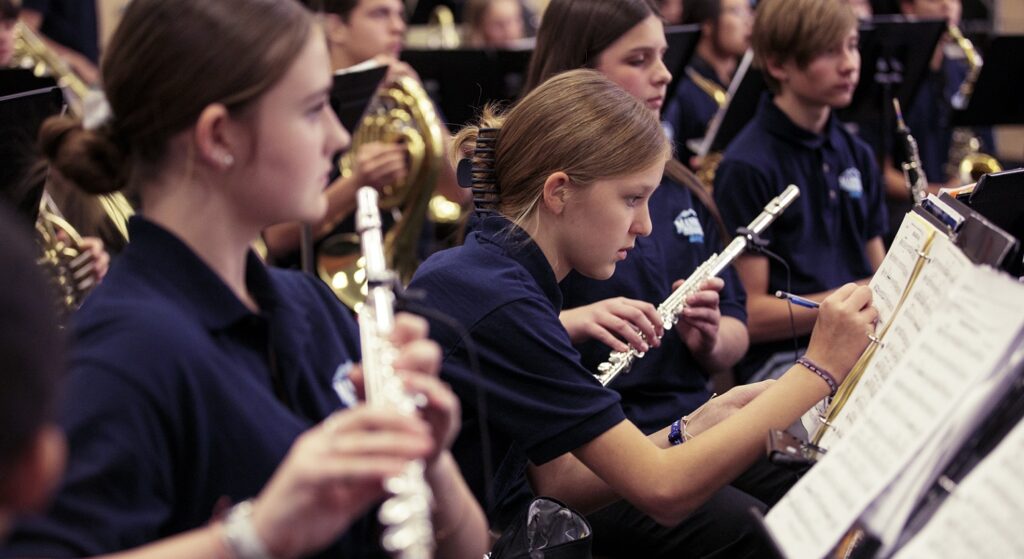Video Game Music Composition: An Art Form
There are many ways to create music for video games. Find what works best for you!
There’s more to video game music than you might think. It presents unique challenges for composers. If this is something you’re interested in tackling as a side gig (read “Side Hustles for Music Teachers”), of if you want to create a fun project for a music tech or music composition class, read on!
Because much of the music in video games is repeated, it must be catchy. However, it must also be unobtrusive so it doesn’t distract players. The musical themes must be designed to loop — the ending must seamlessly connect to the beginning. Writing video game music toes a fine line, which makes it one of the most interesting newer forms of composition.
Video game composers must be familiar with common musical forms like waltzes, overtures and arias so they can create a sonic landscape for each world or scene. They must also delve into the concept of a musical theme and variations. For example, they must compose a main melody that is introduced at the beginning that gradually transforms throughout the game depending on characters’ circumstances.
Here are some questions composers might ask themselves:
- How do I create tension here?
- Where should the sonic release be?
- What does this character sound like?
- How can I support the story’s arc with changes in instrumentation?
How Does a Composer Write and Record Video Game Music?
This trade requires many technical components. A common method used by video game composers it to sketch out their ideas on manuscript paper or notation software like Sibelius, Forte or Dorico. Next, they create their scores with virtual instruments inside a digital audio workstation (DAW). Some composers use a DAW to create the final track, while others will hand off their written score to a group of live musicians and use the MIDI track as more of a reference.
 The good news is that there are many ways to create music for video games, so you can find what works best for you.
The good news is that there are many ways to create music for video games, so you can find what works best for you.
Notation Software: Notation software can be used to create visually organized sheet music, but they often have a function to export to a MIDI format. This format allows composers to move the music they just wrote into various instruments inside a DAW.
DAWS: Digital audio workstations are a must-have for many composers. Once MIDI files are inside the program, composers can move them around to different instruments by clicking and dragging the track. This makes it easy to decide on the right instrument for each part before committing it to the final score. Some composers prefer to compose inside a DAW because the virtual instruments are more similar to what you’d hear in an orchestra than most of the free stock sounds.
Logic is an extremely popular DAW among video game composers. Others use free programs like Reaper or GarageBand. Cubase is another favored (paid) DAW. People also compose in Ableton and PreSonus.
Recording Live Orchestras: Big-name video game composers often have their orchestral-style music recorded by live instrumentalists. Large ensembles are recorded with a combination of main overhead mics and spot mics.
Other Music Tech: Music technology is constantly evolving. For example, we now have digital pianos that you can use to pretty much score movies and video games, from start to finish. Some composers prefer to do it all on a piano. Others like to purchase better sound libraries for their notation software, like Albion One, and go less heavy on the DAW front. Not all composers read music, so they might opt to skip the notation part altogether.
Video Game Genres
Popular video game genres include sports, fighting, platformers, simulation, strategy, horror and role-playing games (RPG).
Video game music varies widely depending on the type of game you’re playing. For example, Resident Evil is a horror/survival series that often sounds whispery, with rumbling bass drums and buzzing synths. Spyro is a fantasy dragon game that incorporates elements of rock and jazz. The puzzle game Seasons After Fall has a mystical, string-heavy and at times near-folksy score, whereas Diablo is haunting in a more war-like Spain-meets-Middle-East way.
How Do Video Game Composers Make Money?
This is an interesting question! Video game composers make money differently than orchestral composers do.
You don’t usually see video game music performed in public. Since it’s not really played on the radio or toured with, performance rights don’t offer any significant compensation. This is one downside of being a video game composer versus a performing artist. So, video game composers typically make their money off royalties from the sale of the video game or from upfront payment from the video game company itself.
How Many Pieces Do They Write?
Composers must write pieces for different worlds, as well as themes for characters and music for cut scenes. It’s hard to say exactly how many pieces are required, but as mentioned at the beginning of this article, video game music must be loopable.
 Many short, repeated themes must be written. Video game composers specialize in incidental music, which is music written for something that isn’t music-centric (such as a symphony you’d buy tickets to see).
Many short, repeated themes must be written. Video game composers specialize in incidental music, which is music written for something that isn’t music-centric (such as a symphony you’d buy tickets to see).
Let’s say a story-oriented video game has a home world, six additional worlds, a big boss battle and a bonus level. That’s nine tracks needed but it doesn’t take into account cut-scenes or sound effects that happen at key moments. This would be a relatively small game by today’s standards. It’s common for a composer to write 30 to 50 pieces per game.
What About Sound Effects?
Typically, sound designers, not video game composers, create sound effects. However, sometimes budgets run low, and musicians may be asked to get creative. Sound effects are often created with virtual instruments but you can also sample things around your house, similar to what Foley artists do in animated movies.
How did Video Game Music First Start?
Rally-X and Space Invaders were two early iterations of video games with music. But the earliest game with a programmed piece of music was a checkers game that featured “God Save the Queen.”
Rally-X was the first video game with a continuous melody. These original games used something called an 8-bit processor to make music that we now call Chiptune (that classic, synthesized electronic sound). Composers used to program sound generator chips to specific notes they wanted them to play. Many video games still have this electronic thread.
Interestingly, from the start, video game music typically looped (repeated seamlessly). Originally, game creators looped short segments of music to save space.
As a Career Path
Video game composing is usually a freelance gig, at least until you work your way up. This isn’t necessarily a bad thing — freelancers work their own hours. But, you must be a self-starter and continually call, email and reach out to video game programmers and companies.
Once you have a portfolio/reel of work, you can start applying to be an in-house composer, which often leads to higher-paying and consistent work.
Here is a list of video game composers who have made a name for themselves doing what they love:
- Koji Kondo (Nintendo)
- Kazumi Totaka (many Nintendo games including Animal Crossing)
- Nobuo Uematsu (Final Fantasy)
- Stewart Copeland (best known as the drummer for The Police, he wrote the music for Spyro)















